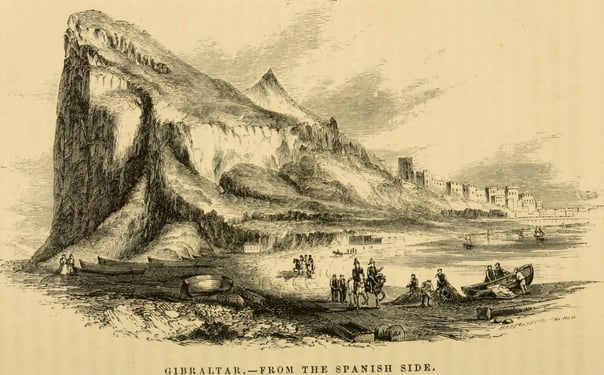 An illustration in The Cruise of the steam yacht North Star... (1854). Courtesy of Wikimedia Commons
An illustration in The Cruise of the steam yacht North Star... (1854). Courtesy of Wikimedia Commons
Over the holidays, my boyfriend’s father and I delved into his family’s genealogy. John has a rich treasure trove of family documents that have been scanned, including an 1885 narrative of the life of Stephen Thomas Acres, his great-great-great-great-great-great-grandfather. I immediately fell in love with Acres’ florid writing style, and his family story traces an interesting pattern of migration from Ireland to Spain to Gibraltar to Iowa. He begins thusly, “Deeming it my duty to place on record, such incidents of my being as will enable my children to know their lineage and descent, and in accordance with their desire so expressed, I now proceed without ostentation, and in the fear of God, to discharge that duty as truthfully as my memory and my own knowledge will enable me to do so.”
Stephen Acres’s story commences with his father Thomas Acres, who was born in County Galway, Ireland, and was a soldier in the British Army. He served in the Peninsular Campaign of 1812–14 in Spain, where he met his future wife Maria Antonia Caja in Cartagena. In 1814, his regiment proceeded to Gibraltar, including newly-married Thomas Acres and his bride. According to Stephen, “the Peninsular war ceasing at about that time, my father was allowed to purchase his discharge from the army, when and where he settled down as a civil inhabitant of that Garrison town.” Thomas lived out his life in Gibraltar as a government employee in the Colonial Office.
Stephen converted to become a Wesleyan Methodist, a faith that would remain important to him for the rest of his life.
As Stephen grew up in Gibraltar, he began to question his Catholic faith. He says, “the moral training I had received under the Roman Catholic influence was at variance with the requirements of Scriptural truth.” He was particularly uncomfortable about confession before a priest, venerating the Virgin Mary or other Saints, and not observing the Sabbath strictly enough. Stephen converted to become a Wesleyan Methodist, a faith that would remain important to him for the rest of his life.
Stephen fell in love with the daughter of his Sunday School teacher, Sarah Newman, or in his words, “her whom I have ever regarded as destined in God’s providence to be the companion of my life.” His love for Sarah is evident throughout his narrative – he goes on to describe her as “the solace of my pilgrimage; the happiness of my home; the faithful mother of my children.” They courted for seven years as they built up the resources to make their own home together, finally marrying in 1841 and settling into newlywed bliss, described by Stephen: “Being now settled down in our new and comfortable home relation, as we thought, for our life, we entered cheerfully into its enjoyment, thankfully accepting the bountiful providences which freely came to us and felt happy in our new Eden.”
In the first ten years of their marriage, Stephen and Sarah had six children, and began to feel that there was not enough room in the “ever crowded” “Garrison town” to meet the needs of their large family. He worried for the “moral training and education” of his children in a diverse town that was known as a smuggling hub. When considering immigrant ancestors, I’m always fascinated by what drove them to change their whole life and move somewhere new. Stephen Acres lays out his whole decision-making process. He says at first they wondered if it was the will of God that they live in Gibraltar in their current circumstances. However, they prayed a lot, consulted their relatives, and decided a move was indeed the right choice, finding “assurance in their hearts that our desires were in accordance with our heavenly Father’s will.”
When considering immigrant ancestors, I’m always fascinated by what drove them to change their whole life and move somewhere new.
At first, they resolved to move to Australia, not, as Stephen specifically points out, as gold diggers, but instead as farmers. However, it was too expensive for them to travel to England, then to Australia. At that time, convicts were sent from England to Gibraltar, where some convicts stayed, then the ships proceeded on to Australia. Stephen applied to be a prison guard on the ship, but his application was denied (by the very office in which his father worked, he points out). This denial provoked in Stephen a radical response, similar to his religious conversion: “But my request was denied, and that circumstance ended my further allegiance to the British Government, for we immediately and unhesitatingly resolved to emigrate to America and become citizens of the United States, identifying all of our future interests with the progressive spirit of the New World.”
In 1853, the Acres family found themselves aboard the Anna Tift, bound for New York. Their ocean voyage proceeded smoothly “although rather long and somewhat tedious,” according to Stephen. He notes that they did not spend any time sightseeing in New York once they arrived, as they had resolved to travel to Waukegan, Illinois: “we had all along determined to make our home in the West, in order to avail ourselves of the many better advantages accruing to industry and thrift.” They took a steamboat up the Hudson to Albany, travelling alternately by land and by water to Waukegan, “having traveled over 8000 miles without a single mishap and in full enjoyment of health.”
Stephen’s Methodist faith provided him with a supportive community as they tried to make a new life for themselves in Illinois. Farming proved impractical for the Acres, and at the urging of his new friends, Stephen took up book-binding. After almost a year, however, the Acres determined that Waukegan was not a growing town, and there would not be enough book-binding business there. They resolved to move on to Burlington, Iowa.
He is very frank about his convictions, religious or political, and how these convictions compelled him to make radical decisions such as a religious conversion or moving to America.
In Burlington, Stephen’s motivations for moving seem to have been completely justified. “Our church associations also became to us pleasurable and profitable,” he notes, “the influences of which had a marked effect in moulding and forming the dispositions and habits of our children, just at this period of their advancement in growth. Their educational privileges, we also found, were inestimable and greatly in advance of anything they could possibly have enjoyed in the old country.” Stephen goes on to extol their familial felicity in Burlington, which I will not quote in full due to his loquaciousness and grammatical complexity. In sum, their prayers were answered, and “we now found ourselves in a condition to look back with great thankfulness” upon the choice they had made to move to America. The Acres had two more children in Iowa, and proceeded to live there for 28 years (at the time of the writing of Stephen’s mini-memoir). Stephen Acres died there two years later, in 1887.
Stephen’s narrative has turned out to be an interesting record not just to his children, interested in his “lineage and descent,” but to us many generations later. He is very frank about his convictions, religious or political, and how these convictions compelled him to make radical decisions such as a religious conversion or moving to America. The story of his family touches on broader history – his father was an Irishman in the British army during the Napoleonic Wars, and Stephen and his family arrived in Iowa during a wave of mass migration to that state. Stephen concludes his narrative by honoring his wife Sarah, who died two years before he wrote his story, as the “companion of his life.” I wish all of our ancestors wrote (and kept) such reflections upon their lives!
Share this:

About Molly Rogers
Molly is from York, PA. She studied English and French at Colby College in Maine and has a Master’s degree in Library and Information Science from Simmons College. She enjoys many outdoor pursuits such as whitewater kayaking, mountain biking and cross-country skiing and has a few indoor hobbies like reading, knitting and creating a genealogy website for her grandmother’s family.View all posts by Molly Rogers →